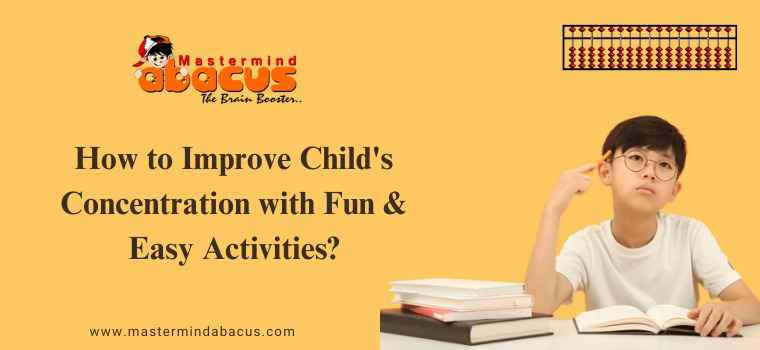
How to Improve Child's Concentration with Fun & Easy Activities
Why Concentration is Key: Activities to Improve Focus in Young Children
As parents, we all want the best for our children, especially when it comes to their education and development. One of the critical skills that can significantly impact a child's learning journey is concentration. A strong ability to focus allows children to grasp new concepts more easily, complete tasks effectively, and improve their overall academic performance. But how can we, as parents, help our children enhance their concentration skills in a fun and engaging way?
Understanding the Importance of Concentration in Children
Concentration is the ability to focus one's attention on a specific task or activity without getting easily distracted. For young children, developing this skill is crucial because it lays the foundation for future learning and cognitive development. A child with good concentration skills is more likely to perform better in school, have greater problem-solving abilities, and develop a strong sense of discipline and patience.
Take the story of little Aryan, a 7-year-old who struggled with staying focused on his schoolwork. His parents noticed that he often lost interest quickly and was easily distracted, making it difficult for him to keep up with his peers. However, after incorporating specific activities designed to improve concentration, Aryan's focus began to sharpen. Over time, his grades improved, and he became more confident in his abilities.
Activities to Improve Concentration in Young Children
Here are some fun and easy activities that can help improve your child's concentration:
1. Memory Games
Memory games are a fantastic way to enhance a child's focus and recall abilities. Simple games like matching pairs or Simon Says require children to pay attention and remember details, which can significantly boost their concentration skills.
How to Play: Create a set of cards with different images or numbers. Lay them face down, and ask your child to find matching pairs by turning over two cards at a time. The game continues until all pairs are found.
Pro Tip: Gradually increase the difficulty level by adding more cards to the game or reducing the time allowed to find a match.
2. Puzzles and Mazes
Puzzles and mazes are excellent tools for developing concentration and problem-solving skills. Completing a puzzle requires children to focus on the task at hand, analyze pieces, and think critically.
How to Play: Provide age-appropriate puzzles or maze books. Start with simpler puzzles and gradually move to more complex ones as your child's skills improve.
Pro Tip: Encourage your child to take their time and not rush through the puzzle. This teaches patience and attention to detail.
3. Breathing Exercises and Mindfulness
Mindfulness exercises and breathing techniques are powerful tools for enhancing concentration. Teaching your child to focus on their breathing can help calm their mind and improve their ability to concentrate.
How to Practice: Start with simple breathing exercises like "balloon breathing," where the child imagines inflating a balloon with each inhale and slowly releasing air with each exhale.
Pro Tip: Incorporate mindfulness activities like "five senses exercise," where the child focuses on what they can see, hear, smell, taste, and touch at that moment.
4. Creative Storytelling and Drawing
Engaging children in storytelling or drawing can significantly improve their focus and imagination. These activities require them to concentrate on details and express their thoughts clearly.
How to Practice: Encourage your child to create their own story or draw a scene from a favorite book. Ask them to explain their drawing or narrate their story to build communication skills.
Pro Tip: Participate in the activity with your child to make it more interactive and enjoyable.
5. Physical Activities and Sports
Physical activities like playing catch, swimming, or even yoga can help children improve their concentration. Sports require children to pay attention to rules, coordinate their movements, and stay focused on the game.
How to Practice: Set a regular schedule for physical activities that your child enjoys. Encourage them to participate in team sports to learn focus, discipline, and teamwork.
Pro Tip: Try activities like yoga, which combines physical movement with mindfulness, further enhancing concentration skills.
Incorporating Abacus Learning to Boost Concentration
One unique and highly effective way to improve concentration and cognitive skills in children is through abacus learning. The abacus, a simple yet powerful tool, helps children develop mental math skills, memory, and concentration. Studies have shown that children who learn the abacus can solve mathematical problems quickly and accurately, thanks to their enhanced ability to focus and retain information.
Consider the case of Anaya, an 8-year-old who joined an online abacus class. Initially, she found it challenging to concentrate on numbers and calculations. However, with regular practice and interactive sessions, she became proficient in using the abacus. Not only did her math skills improve, but her overall concentration levels also increased. Anaya’s parents were thrilled to see her newfound focus and confidence in both her academic and daily activities.
If you're interested in exploring the benefits of abacus learning for your child, consider enrolling them in an online abacus class. At Mastermind Abacus's Online Classes, we offer a structured program designed to enhance your child's cognitive skills, including concentration and memory, through fun and engaging activities.
Actionable Tips for Parents
Here are a few practical tips for parents to help their children improve concentration:
Create a Distraction-Free Environment: Ensure that your child's study area is free from distractions like TV, gadgets, or loud noises.
Set Short and Manageable Tasks: Break down larger tasks into smaller, manageable segments to keep your child engaged and focused.
Incorporate Regular Breaks: Encourage your child to take short breaks between study sessions to avoid burnout and maintain focus.
Encourage a Healthy Diet and Proper Sleep: Proper nutrition and adequate sleep play a crucial role in a child's ability to concentrate and perform well academically.
Conclusion
Improving your child's concentration doesn't have to be a daunting task. By incorporating fun and engaging activities, you can help them develop this essential skill while enjoying quality time together. Whether it's through memory games, puzzles, or even learning the abacus, the key is to find activities that captivate your child's interest and challenge their cognitive abilities.
Remember, every child is unique, and their journey to developing concentration will differ. Be patient and supportive, and watch as your child's ability to focus and succeed in their academic pursuits grows.
For those interested in taking a more structured approach to improving their child's concentration and cognitive skills, consider enrolling in Mastermind Abacus's Online Classes. Our experienced instructors and interactive sessions are designed to provide a fun and effective learning experience for children aged 6 to 12.
By nurturing your child's concentration skills today, you're setting the foundation for a brighter, more focused future.





.png)